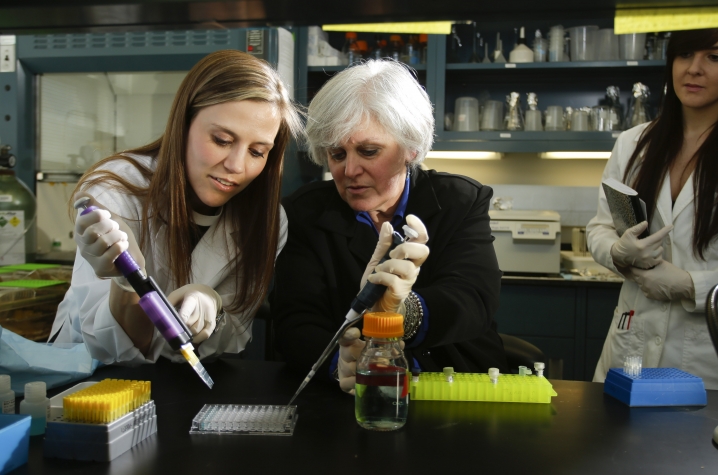Trustees Say UK Must Invest in Research to Address State's Most Pressing Needs
LEXINGTON, Ky. (Oct. 18, 2014) — The University of Kentucky Board of Trustees Saturday adopted a sweeping statement of principles, directing President Eli Capilouto to focus on the "most pressing" needs of Kentucky by determining how best to grow UK's research enterprise through strategic investments in facilities and talent.
"The challenges are overwhelming, but we can be up to the task of making a difference," Capilouto said. "These are not easy issues, but they must be our issues. The University of Kentucky represents the greatest hope in making progress against these issues, but it will take focus."
The resolution, adopted unanimously at the board's two-day annual retreat, directs Capilouto to take the steps necessary recognizing "the essential nature and value of all scholarly and creative activity" to:
· Align resource commitments to optimize efficiency and facilitate faculty, student and staff success;
· Recruiting and retaining world-class scholars and research teams;
· Strengthening the commitment to interdisciplinary exploration; and
· Confirming and detailing the critical need for additional research infrastructure.
"These principles reflect who we are as a people and as an institution," said Keith Gannon, chair of the trustees. "These principles synthesize the depth of the challenge we face and what must be the approach as we honor the mission that must be — and is — uniquely ours at the University of Kentucky."
Trustees have used their annual retreats over the last four years to focus intently on university priorities and, with President Capilouto, to articulate an institutional agenda and direction for moving forward.
On the first day of the retreat Friday, UK trustees received an overview of the university's research enterprise in areas such as health and energy as well as information about the challenging funding climate for grants and awards.
Trustees also reviewed data illustrating the Commonwealth's distressing challenges, particularly with respect to health issues such as cancer, heart disease and other preventable deaths.
Kentucky has mortality rates above national averages in most major health indices ̶̶ ̶ challenges that are particularly acute in the state's Appalachian region.
Capilouto described for trustees how UK is “uniquely positioned to help answer” the most fundamental challenges confronting the Commonwealth.
UK is uniquely positioned, Capilouto said, because of a number of factors:
· An extension network and clinical programs that reach all of the state’s 120 counties;
· 170 clinical outreach practices;
· 17 colleges and professional schools supported by a campus-wide research library system;
· The fact that UK is one of only eight universities in the country with the full range of health, professional and undergraduate programs on one contiguous campus; and
· UK is one of only 22 institutions in the country with a trifecta of federal designations of excellence in three key areas of health — cancer, aging and translational science, the idea that discoveries can be taken from the laboratory into communities where they have an impact.
Capilouto and leading researchers at UK told trustees during the retreat that attacking Kentucky’s systemic challenges will require close collaboration among many academic and research disciplines.
Many of the maladies that affect Kentucky communities are manifest in issues indirectly tied to health care — poverty, education, socio economic mobility — and the University’s breadth and depth of intellectual expertise can help address these challenges, holistically.
In other board action Saturday, Trustees approved the awarding of two honorary doctorates:
—Don L. Jacobs will be awarded an Honorary Doctor of Humanities. Jacobs has owned 14 automobile dealerships in Kentucky, Tennessee and Florida. He is a passionate philanthropist on behalf of education in Kentucky, with gifts supporting the Sayre School, the Gatton College of Business and Economics and UK HealthCare.
—Brady J. Deaton, former chancellor of the University of Missouri from 2004-2013 and a graduate of UK, will receive an Honorary Doctor of Science. Deaton grew up on a family farm in Kentucky and received bachelor's and master's degrees from UK. He held a number of key administrative appointments at the University of Missouri before becoming chancellor.
The board also:
—Approved an increase in scope from $1.6 million to $2.7 million for a project being conducted by UK's Center for Applied Energy Research. The Slipstream Capital Project is designed to test a carbon dioxide capture system and is funded with a grant from the U.S. Department of Energy National Energy Technology Laboratory.
—Board members moved toward completely "paperless" meetings by utilizing a new meeting software tool called "Directors Desk." The new tool will allow board members to download all meeting materials, rather than using paper copies.






